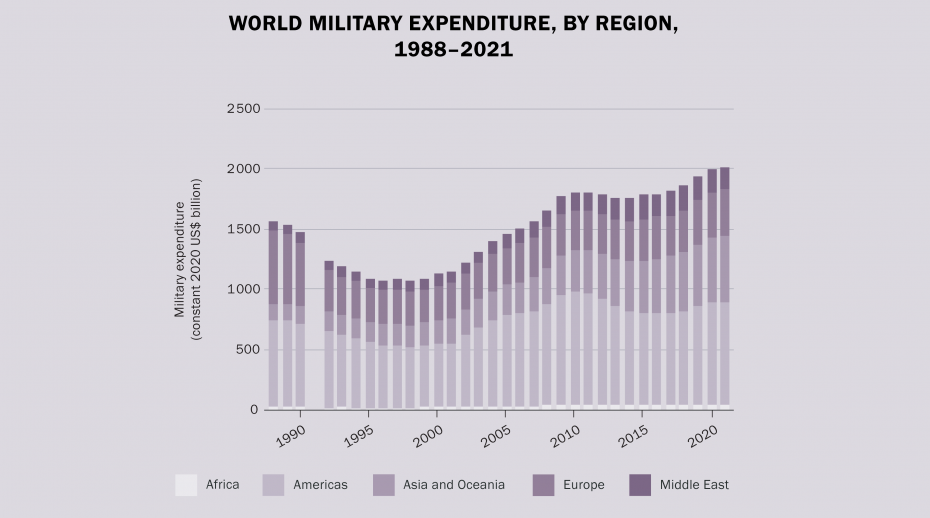Click Here for INL News Amazon Best Seller Books
 Click Here for INL News Amazon Best Seller Books
Click Here for INL News Amazon Best Seller BooksClick Here for the best range of Amazon Computers
Click Here for INL News Amazon Best Seller Books
Amazon Electronics - Portable Projectors
INLTV Uncensored News
INLTV is Easy To Find Hard To Leave
World military expenditure passes $2 trillion for first time
World-military-spending-totalled-more-than-$US1.6-trillion-in-2015. (wikipediaexposed.org)
".It is recorded fact that .AIDS is a biological weapon developed by the USA Defense Department and funded by the USA Congress ......" ...... Colonel. L. Fletcher Prouty who worked for the Office of Strategic Services (OSS), CIA and Pentagon, and served as Chief of Special Operations for the Joint Chiefs of Staff under President John F. Kennedy.
http://www.wikipediaexposed.org/csk_p.9.html
25 April 2022

World military spending continued to grow in 2021, reaching an all-time high of $2.1 trillion. This was the seventh consecutive year that spending increased. ‘Even amid the economic fallout of the Covid-19 pandemic, world military spending hit record levels,’ said Dr Diego Lopes da Silva, Senior Researcher with SIPRI’s Milit…
World military expenditure passes $2 trillion for first time
The U.S. accounted for 37 percent of the total. U.S. military expenditures are roughly the size of the next seven largest military budgets around the world, combined. U.S. military spending dwarfs the budget of the #2 country – China.
The U.S. outpaces all other nations in military expenditures. World military spending totaled more than $1.6 trillion in 2015. The U.S. accounted for 37 percent of the total.
U.S. military expenditures are roughly the size of the next seven largest military budgets around the world, combined.
https://www.nationalpriorities.org/campaigns/us-military-spending-vs-world/
(Stockholm, 25 April 2022) Total global military expenditure increased by 0.7 per cent in real terms in 2021, to reach $2113 billion. The five largest spenders in 2021 were the United States, China, India, the United Kingdom and Russia, together accounting for 62 per cent of expenditure, according to new data on global military spending published today by the Stockholm International Peace Research Institute (SIPRI).
Zain Khan, Secret Societies & The Global Elite explained by Dean Henderson
Breaking News, Finance News, Economic News
http://globalelite.tv/2018/07/08/secret-societies-the-global-elite/
The Builderberg Group?
Are a few families controlling the World? What Are Secret Societies?
So What Is Bohemian Grove?
Who Is The West's Secret Power Group?
Secret Societies To Run The World
Day Two On The Quiet Men That Control Our Destiny
The Daily Mirror revealed the power of the Trilateral Commission ... as part of a group of global manipulators... The Trilateral Commission has strong power. privige. for influence in the way the world is run and organised...
Every year 120 of the most powerful and influential men come together and lock themselves away for three days and decide what policies the democratic nations of the West should follow. They are the members of the Builderberger Group, and their meetings are always kept a closely guard secret.
But I can name that this year they will meet of Archen, just 40 miles from the German Capital, Berlin, from April the 18th to 26th Inclusive.
I can also reveal that the German President, Walter Has been invited to replace the aging..... a chairman of the Builderberger Group ... the German President, Walter has accepted. On top of the agenda will be world polics and economics following the American Invasion of Afghanastan...
Buildergers represent the elite and wealthy establishment of every Western Country. They include bankers, politicians, diplomats, snd leaders of the various western nations. Among British politicians who have attended the Builderberg Meetings are Edward Heath, Harold Wilson, James Callahan, Margaret Thatcher, Denis Horgan, Enock Powell.
Other members of the British Establishment include Lord Full of merchant banking,
The Federal Reserve by Das Kartrell
The Discuss this topic today, we have earlier interviewed an author and also researcher on this subject.... but before we get to our interview I'd like to ask all of out viewers to subscribe to our channel because this is Zain Khan and we are live..
Dean Henderson is an Author and Researcher
The Question is asked of Dean Henderson
Who Controls The World?
Answer:
I did a Master Thesis in 1991 when the the USA was planning the Gulf War..
Called " A Political Economy of Middle East Oil .. The GCC Original Research Security System... for the Regime of International Capital Accumulation"
It was one of these long academic titles ... a 144 page thesis..
I wanted to find out who owned the oil companies in that were involved in the oil in the Middle East ..and everyone knew Iraq was about oil..
Military expenditure reaches record level in the second year of the pandemic
World military spending continued to grow in 2021, reaching an all-time high of $2.1 trillion. This was the seventh consecutive year that spending increased.
‘Even amid the economic fallout of the Covid-19 pandemic, world military spending hit record levels,’ said Dr Diego Lopes da Silva, Senior Researcher with SIPRI’s Military Expenditure and Arms Production Programme. ‘There was a slowdown in the rate of real-terms growth due to inflation. In nominal terms, however, military spending grew by 6.1 per cent.’
As a result of a sharp economic recovery in 2021, the global military burden—world military expenditure as a share of world gross domestic product (GDP)—fell by 0.1 percentage points, from 2.3 per cent in 2020 to 2.2 per cent in 2021.
United States focuses on military research and development
US military spending amounted to $801 billion in 2021, a drop of 1.4 per cent from 2020. The US military burden decreased slightly from 3.7 per cent of GDP in 2020 to 3.5 per cent in 2021.
US funding for military research and development (R&D) rose by 24 per cent between 2012 and 2021, while arms procurement funding fell by 6.4 per cent over the same period. In 2021 spending on both decreased. However, the drop in R&D spending (–1.2 per cent) was smaller than that in arms procurement spending (–5.4 per cent).
‘The increase in R&D spending over the decade 2012–21 suggests that the United States is focusing more on next-generation technologies,’ said Alexandra Marksteiner, Researcher with SIPRI’s Military Expenditure and Arms Production Programme. ‘The US Government has repeatedly stressed the need to preserve the US military’s technological edge over strategic competitors.’
Russia increases military budget in run-up to war
Russia increased its military expenditure by 2.9 per cent in 2021, to $65.9 billion, at a time when it was building up its forces along the Ukrainian border. This was the third consecutive year of growth and Russia’s military spending reached 4.1 per cent of GDP in 2021.
‘High oil and gas revenues helped Russia to boost its military spending in 2021. Russian military expenditure had been in decline between 2016 and 2019 as a result of low energy prices combined with sanctions in response to Russia’s annexation of Crimea in 2014,’ said Lucie Béraud-Sudreau, Director of SIPRI’s Military Expenditure and Arms Production Programme.
The ‘national defence’ budget line, which accounts for around three-quarters of Russia’s total military spending and includes funding for operational costs as well as arms procurement, was revised upwards over the course of the year. The final figure was $48.4 billion, 14 per cent higher than had been budgeted at the end of 2020.
As it has strengthened its defences against Russia, Ukraine’s military spending has risen by 72 per cent since the annexation of Crimea in 2014. Spending fell in 2021, to $5.9 billion, but still accounted for 3.2 per cent of the country’s GDP.
Continued increases by major spenders in Asia and Oceania
China, the world’s second largest spender, allocated an estimated $293 billion to its military in 2021, an increase of 4.7 per cent compared with 2020. China’s military spending has grown for 27 consecutive years. The 2021 Chinese budget was the first under the 14th Five-Year Plan, which runs until 2025.
Following initial approval of its 2021 budget, the Japanese Government added $7.0 billion to military spending. As a result, spending rose by 7.3 per cent, to $54.1 billion in 2021, the highest annual increase since 1972. Australian military spending also increased in 2021: by 4.0 per cent, to reach $31.8 billion.
‘China’s growing assertiveness in and around the South and the East China seas have become a major driver of military spending in countries such as Australia and Japan,’ said SIPRI Senior Researcher Dr Nan Tian. ‘An example is the AUKUS trilateral security agreement between Australia, the United Kingdom and the United States that foresees the supply of eight nuclear-powered submarines to Australia at an estimated cost of up to $128 billion.’
Other notable developments:
- In 2021 Iran’s military budget increased for the first time in four years, to $24.6 billion. Funding for the Islamic Revolutionary Guard Corps continued to grow in 2021—by 14 per cent compared with 2020—and accounted for 34 per cent of Iran’s total military spending.
- Eight European North Atlantic Treaty Organization (NATO) members reached the Alliance’s target of spending 2 per cent or more of GDP on their armed forces in 2021. This is one fewer than in 2020 but up from two in 2014.
- Nigeria raised its military spending by 56 per cent in 2021, to reach $4.5 billion. The rise came in response to numerous security challenges such as violent extremism and separatist insurgencies.
- Germany—the third largest spender in Central and Western Europe—spent $56.0 billion on its military in 2021, or 1.3 per cent of its GDP. Military spending was 1.4 per cent lower compared with 2020 due to inflation.
- In 2021 Qatar’s military spending was $11.6 billion, making it the fifth largest spender in the Middle East. Qatar’s military spending in 2021 was 434 per cent higher than in 2010, when the country last released spending data before 2021.
- India’s military spending of $76.6 billion ranked third highest in the world. This was up by 0.9 per cent from 2020 and by 33 per cent from 2012. In a push to strengthen the indigenous arms industry, 64 per cent of capital outlays in the military budget of 2021 were earmarked for acquisitions of domestically produced arms.
For editors
SIPRI monitors developments in military expenditure worldwide and maintains the most comprehensive, consistent and extensive publicly available data source on military expenditure. The comprehensive annual update of the SIPRI Military Expenditure Database is accessible from today at www.sipri.org.
All percentage changes are expressed in real terms (constant 2020 prices) unless otherwise stated. Military expenditure refers to all government spending on current military forces and activities, including salaries and benefits, operational expenses, arms and equipment purchases, military construction, research and development, and central administration, command and support. SIPRI therefore discourages the use of terms such as ‘arms spending’ when referring to military expenditure, as this represents only one category of expenditure.
Media contacts
For information and interview requests contact
Alexandra Manolache, SIPRI Media and Communications Officer (This email address is being protected from spambots. You need JavaScript enabled to view it., +46 766 286 133), or
Stephanie Blenckner, SIPRI Communications Director (This email address is being protected from spambots. You need JavaScript enabled to view it., +46 8 655 97 47).






